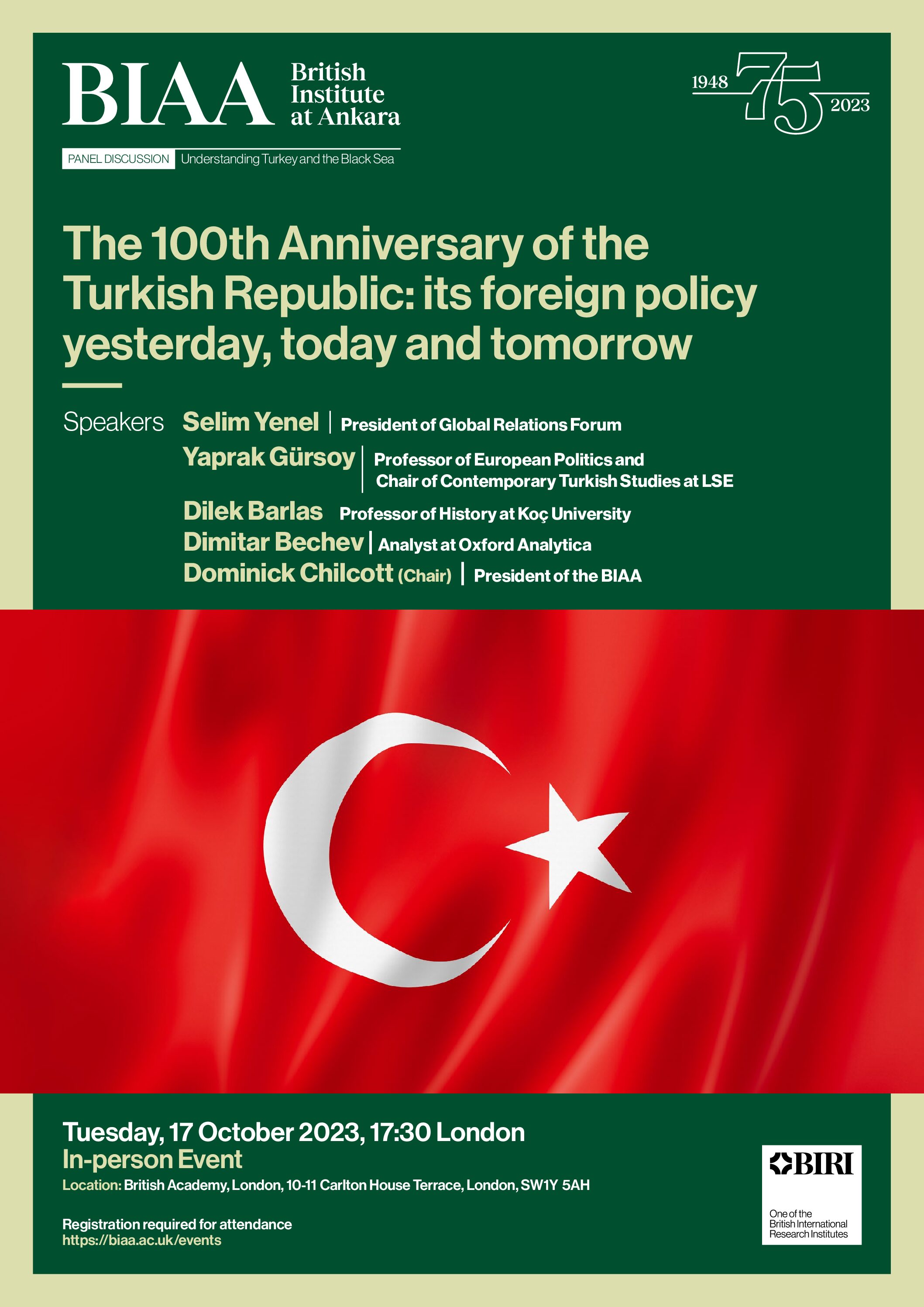
Location British Academy, London
Date and time
Tuesday 17 October 2023
16:30 - 18:00 (London GMT)
19:30 - 21:00 (Ankara UTC+3)
Speakers
Selim Yenel
President of Global Relations ForumYaprak Gürsoy
Professor of European Politics and Chair of Contemporary Turkish Studies at LSEDilek Barlas
Professor of History at Koc UniversityDimitar Bechev
Analyst at Oxford Analytica Dominick Chilcott (Chair)
President of the BIAA
This October, the Republic of Türkiye celebrates its 100th anniversary. Turkish foreign policy has changed much during the century. Mustafa Kemal Atatürk’s foundational principle was ‘Peace at home and peace abroad’, guiding a strategy of neutrality in international affairs that lasted until the final days of the Second World War. Key turning points thereafter were Türkiye joining Nato in 1952 and the signing of the ‘Ankara Agreement’ with the EU in 1963 that looked ahead to Türkiye’s becoming a member state. The post-war years also saw the rise to prominence of the Cyprus issue accompanied by an increase in tension between Athens and Ankara. The end of the Cold War, the two Gulf wars and the Arab Spring transformed the geopolitics of Türkiye’s region again and prompted Ankara to adopt a more active and interventionist approach to its neighbourhood. Under President Erdogan, Türkiye has pursued an quasi-independent strategic posture and, despite its NATO membership, developed closer ties with Russia. President Erdogan has also attempted to cultivate closer relations with African, Balkan and Middle Eastern countries while relations with the United States and European Union have become volatile, distant and transactional. Russia’ invasion of Ukraine presents a further challenge to Türkiye’s efforts to have productive relations with both the West and Russia. The panel of academic experts and foreign policy practitioners will discuss the course of Türkiye’s international posture during the first 100 years of the Republic, the heady mix of contemporary problems the country faces and the likely future course of Turkish foreign policy in the near and long term.

Selim Yenel (1956, Istanbul) entered Ministry of Foreign Affairs in 1979. Posted to the OECD, Paris (1981 – 84), Turkish Embassy in Kabul, Afghanistan (1984 – 86), UN in New York (1988 – 92), Turkish Delegation to EU (1994 – 99). Deputy Director General for EU, Ankara (1999 - 2005). Ambassador to Vienna (2005 – 09). Deputy Under-Secretary for Bilateral Political Affairs (2009 – 11). Ambassador to EU (2011 – 17). Undersecretary at the Ministry of EU Affairs (Jan 2017 - July 2018). Currently President of Global Relations Forum.
Yaprak Gürsoy (@ygursoy) is Professor of European Politics and Chair of Contemporary Turkish Studies at LSE. She has worked on Turkish civil-military relations, foreign policy, Europeanisation, and Anglo-Turkish relations. Her related publications include "Reconsidering Britain’s Soft Power: Lessons from the Perceptions of the Turkish Political Elite," Cambridge Review of International Relations and "Emotions and Narratives of the Spirit of Gallipoli: Turkey’s Collective Identity and Status in International Relations," British Journal of Middle Eastern Studies.
Dilek Barlas has been a Professor of History at Koç University, Istanbul since 1993. She is the author of two books titled: Etatism and Diplomacy in Turkey, 1929-1939: Economic and Foreign Policy Strategies in an Uncertain World (Brill, 1998) and Turkey in the Mediterranean during the Interwar Era (Indiana University Turkish Studies, 2010) She is also one of the editors of a book, From Enemies to Allies, Turkey and Britain, 1918-1960 (Routledge, 2023). Barlas has many articles published in international journals on the Balkan and Mediterranean history. Between 2008-2014, Barlas was also the Turkish Representative of the Standing Committee for the Humanities, European Science Foundation (ESF).
Dimitar Bechev is a visiting scholar at Carnegie Europe, where he focuses on Central, Eastern, and Southeastern Europe. He is also a lecturer at the Oxford School of Global and Area Studies, University of Oxford. Bechev is the author of Turkey under Erdogan (Yale University Press, 2022), Historical Dictionary of North Macedonia (Rowman, 2019), and Rival Power: Russia in Southeast Europe (Yale UP, 2017) as well as co-editor of Russia Rising: Putin’s Foreign Policy in the Middle East and North Africa (Bloomsbury, 2021). He has also published numerous academic articles and policy reports.
Sir Dominick Chilcott is a retired diplomat who served as High Commissioner to Sri Lanka and Maldives (2006-2007), deputy ambassador to the United States (2008-11), and then Ambassador to Iran (2011), Ireland (2012-16) and the Republic of Türkiye (2018-22). He now works as an independent consultant, becoming President of the BIAA in December 2022.